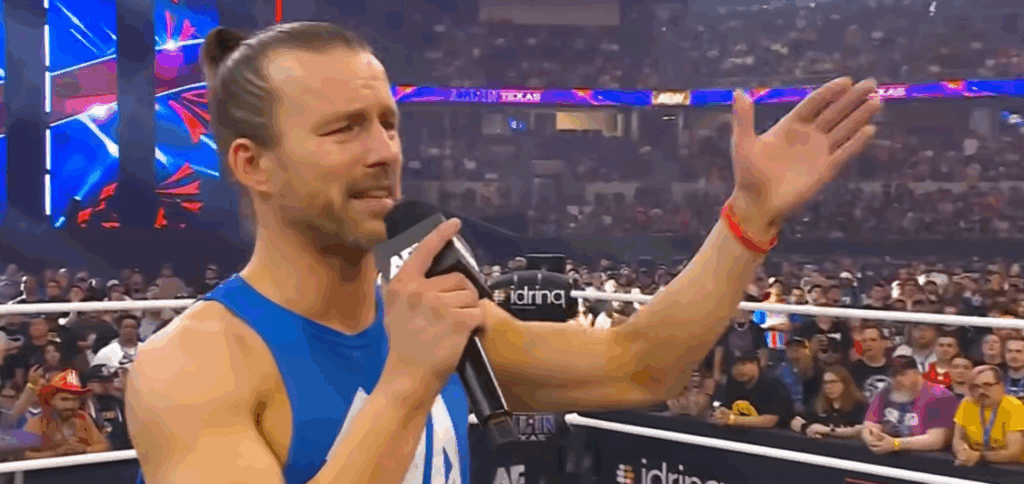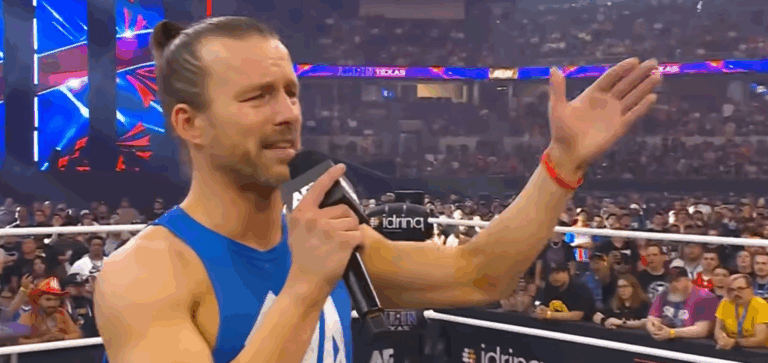Instead of competing in a wrestling match, Adam Cole recently took center stage at AEW All In: Texas to give a heartfelt speech that completely altered the atmosphere of the event. His purpose was not to defend his title. He was there to give it up instead, admitting that his continued health issues have drastically changed the course of his career. Fans were brought together by the statement’s remarkable ability to quell rumors and express a shared concern for the man who was formerly known as “The Panama City Playboy.”
Cole recognized a deeper problem when he vacated the TNT Championship, stating that his body, particularly his brain, could no longer withstand the strain that professional wrestling demands. Although it wasn’t executed particularly well, the lariat that allegedly caused his most recent concussion was the last straw in an already precarious neurological history. Recurring symptoms of concussions are notoriously hard to predict and frequently impossible to ignore.
Cole has not been known for his raw power throughout his career, but rather for his eloquent ring psychology and captivating presence. His performances were especially inventive because of this distinction, which enabled him to enthrall audiences without relying too much on physical force. However, his long-term health has not been kindly treated by the same strategy, which is full of bumps, fast sequences, and high-risk maneuvers.
Adam Cole Bio and Career Table
| Attribute | Details |
|---|---|
| Full Name | Austin Kirk Jenkins |
| Ring Name | Adam Cole |
| Date of Birth | July 5, 1989 |
| Age | 36 (as of 2025) |
| Height | 6 feet (1.83 m) |
| Weight | Approximately 200 lbs (91 kg) |
| Nationality | American |
| Notable Promotions | All Elite Wrestling (AEW), WWE (NXT), Ring of Honor (ROH) |
| Titles Held | NXT Champion (WWE), TNT Champion (AEW), ROH World Champion |
| Current Status | On medical hiatus due to health issues, notably concussions |
| Link for Reference | Economic Times Report |

The last three years have been an exceptionally challenging time for Cole. Following a severe concussion at AEW x NJPW Forbidden Door in 2022, he was sidelined for almost ten months. An ankle injury sent him back into recuperation just as he was starting to pick up steam again. Because of this pattern—momentum broken by bad luck—his ring time in AEW has been drastically cut down, leaving fans to question how much longer his body can withstand.
The poignancy of this situation has been further enhanced by backstage reactions. During Cole’s announcement, AEW and The Paragon employees were reportedly seen sobbing in public. When she broke the news during the preshow, Renee Paquette looked clearly shaken. The indication that something more serious than a typical injury was developing was very evident. In a field where actors frequently conceal their suffering behind characters, this kind of unadulterated emotional openness is uncommon—and incredibly humanizing.
In professional wrestling, Cole has shown surprisingly bravery by willingly stepping back. A maturing change in industry culture is reflected in Cole’s decision to put recovery first, even though many wrestlers have persevered through severe injuries in order to perform. Injury was reframed as a deeply personal crossroads rather than just a professional obstacle thanks to similar decisions made by peers like Edge and Bryan Danielson.
Bryan Danielson and Cole seem remarkably similar in the context of their respective journeys. Concussion-related problems forced Danielson to retire, but he returned years later following a rigorous rehabilitation program. He had a very effective but uncommon way back. The majority don’t go back, and many shouldn’t.
The way Cole dealt with it is what gives his story its unique emotional resonance. “I’m not in the right frame of mind, so I don’t want to consider retiring,” he admitted. A long, sincere ovation from the audience provided a moment of group healing. Supporters were applauding a man who at last admitted, “I need time,” rather than lamenting a title.
The repercussions for AEW are noteworthy. The four-way title match between Dustin Rhodes, Sammy Guevara, Kyle Fletcher, and Daniel Garcia was swiftly changed. The title was eventually won by Rhodes, a veteran who has long been renowned for his tenacity. Nevertheless, Cole’s absence hung over the night like a heavy shadow. After igniting crowds with a defiant rendition of “Bay Bay,” his voice was now begging for patience.
The tone has changed from frustration to empathy in Reddit forums and wrestling podcasts. One fan wrote, “You could just tell there was something going on,” which was very insightful. His weight is dropping, and he appears jaundiced. This is a serious situation. Even though these remarks are speculative, they show a very perceptive fan base that can identify subtle declines and react with concern rather than criticism.
In contemporary professional sports, Cole’s predicament reflects a larger pattern. Even at the expense of their best years in the sport, athletes from all leagues are increasingly opting to deal with health concerns head-on. The phrase “tough it out” has given way to “heal to thrive,” as seen in the cases of Simone Biles in gymnastics and Andrew Luck in the NFL. Cole’s recent behavior is consistent with this mentality; he is no longer prepared to jeopardize his long-term health for momentary adrenaline.
Through the use of transparency, Cole might have created opportunities outside of the ring. The possibilities for his future are endless, whether it is as a manager, coach, commentator, or even a mental health advocate. His willingness to share this vulnerable moment has significantly enhanced his post-ring career prospects, given his extensive storytelling expertise, peer respect, and devoted fan base.
AEW is probably going to continue without its most popular tactician in the upcoming months. However, the ramifications of Cole’s choice will last much longer. Choosing health is a sign of self-respect, not weakness, as he reminded the audience and possibly his fellow wrestlers. That is a very powerful message, especially in a culture that values toughness.


